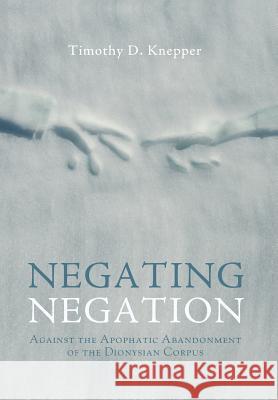Negating Negation » książka
Negating Negation
ISBN-13: 9781498216906 / Angielski / Twarda / 2013 / 170 str.
Negating Negation
ISBN-13: 9781498216906 / Angielski / Twarda / 2013 / 170 str.
(netto: 152,04 VAT: 5%)
Najniższa cena z 30 dni: 157,44
ok. 16-18 dni roboczych.
Darmowa dostawa!
Negating Negation critically examines key concepts in the corpus of Pseudo-Dionysius the Areopagite: divine names and perceptible symbols, removal and negation, hierarchy and hierurgy, ineffability and incomprehensibility. In each case it argues that the Dionysian corpus does not negate all things of an absolutely ineffable God; rather it negates few things of a God that is effable in important ways. Dionysian divine names are not inadequate metaphors or impotent attributes but transcendent divine causes. Divine names are not therefore flatly negated of God but removed as ordinary properties to be revealed as divine causes. The hierurgical rituals and hierarchical ranks of the church are also not negated or bypassed but serve as the necessary means of return to God. This Dionysian God is therefore not absolutely unknowable and ineffable but extraordinarily knowable and sayable as scripturally revealed and hierarchically conveyed. Negating Negation concludes that since the Dionysian corpus does not abandon all things to apophasis, it cannot be called to testify on behalf of (post)modern projects in religious pluralism and anti-ontotheology. Quite the contrary, the Dionysian corpus gives reason for suspicion of such projects, especially when they relativize or metaphorize religious belief and practice in the name of absolute ineffability. ""Knepper sweeps away the assumption that Dionysian metaphysics is fundamentally apophatic. He offers an intriguing look at the positive dimensions of divine names in particular, and at the Dionysian cosmos, as a whole. In doing so, he changes the impact Dionysius has on a philosophical understanding of God."" --Sarah Wear, Associate Professor of Classics, Franciscan University of Steubenville, Pennsylvania ""At last, a book about Dionysius that ends the myth of an alternative 'negative theology' and avoids anachronistic construals in terms of either linguistic analysis or pure phenemenology. Instead, we are presented with the full-blown strange world of ancient oriental Christianity where names are angels and liturgical action lies beyond either affirmation or negation. Yet it was just this world that later resonated in the medieval West, and can still resonate with us today, if we are prepared to be genuinely subverted."" --John Milbank, Research Professor of Religion, Politics, and Ethics, University of Nottingham Timothy Knepper is Associate Professor of Philosophy at Drake University, where he chairs the Department of Philosophy and Religion and directs The Comparison Project.











